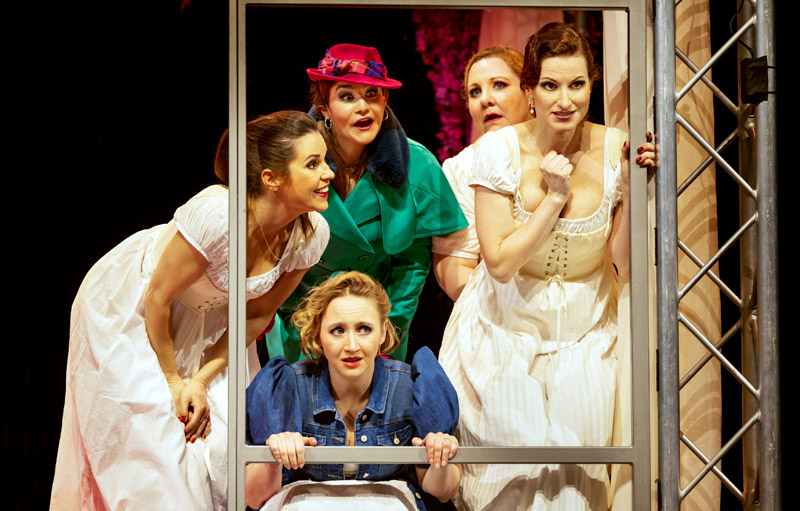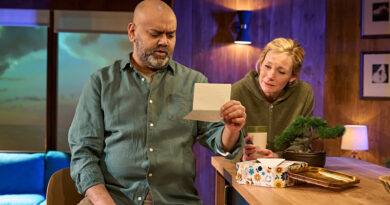“Pride and Prejudice”, Komödie im Theater am Potsdamer Platz
Hans-Jürgen Bartsch in Berlin
Five years ago, the Komödie was compelled to go into temporary exile when wrecking balls started demolishing the building where it was housed (together with the adjacent, now defunct, Theater am Kurfürstendamm). A new high-rise office and shopping complex which is to replace the demolished building will also contain a new auditorium for the Komödie, but it is still a building site. The theatre’s return to its old address has been postponed several times. Last December, after a four-year exile at the Schiller Theater, West Berlin’s former state theatre, it had to move to yet another interim venue, a musical theatre in the city centre (which also hosts the Berlinale, the annual international film festival) where it is now operating as the “Komödie am Kurfürstendamm im Theater am Potsdamer Platz”. Its odyssey is expected to end in the autumn of 2024 – three years later than initially forecast.

The ensemble.
Photo credit: Franziska Strauss.
Its first new production there is a comedy that has been imported from Britain: Stolz und Vorurteil (oder so), is the translation into German of Pride and Prejudice (sort of), a play with songs by Isobel McArthur, based on Jane Austen’s novel. It premiered in Glasgow in 2018, went on tour throughout the UK and was revived in 2021 at the Criterion Theatre in London under a new director and with a different cast, winning that year’s Laurence Olivier Award for Best Entertainment or Comedy Play. Best entertainment it certainly is.
Like many, if not most, theatregoers, I was intrigued to see how the Komödie, a medium-sized private theatre without a permanent ensemble, would cope with a play featuring some twenty characters, and how it would attract every night 1700 spectators (the seating capacity of the Theater am Potsdamer Platz), one thousand more than it was used to accommodate at its former residence on Kurfürstendamm. The gamble paid off; on most evenings the number of sold tickets came close to the “full house” limit. The production team owes this resounding success to the playwright’s ingenious conversion of an early 19th century tale into a highly amusing stage play for our times and, above all, to a cast of five brilliant actresses who bring the story to life on stage, each playing between two and six of the altogether nineteen characters, both female and male. To overcome the problem of acoustics in this vast auditorium, they are equipped with microports so that they may be heard even by spectators in the last (45th!) row.
The evening starts with the quintet appearing as maidservants, apprising us of the gist of what we are going to see: how Mrs Bennet, an aspiring middle-class woman and mother of five daughters (Nadine Schori), tries to secure her offspring a good future by marrying them off to wealthy men, because under the law at the time girls could not inherit the family property. She is convinced that “a single man in possession of a good fortune must be in want of a wife”, as Austen states in the opening line of her novel. She sends her girls to upper-class social functions in the neighbourhood and induces them to charm the nobleman Bingley (Birthe Wolter) and his friend Darcy (Nadine Schori in a second role), Bingley being Mrs Bennet’s favourite candidate, because he is “rich, young, handsome and single”.
The daughters are not as cooperative as their matchmaking mother would wish them to be. To please her they obey, but rather reluctantly; none seems enthusiastic about marrying into the landed gentry simply to secure them a comfortable life. The buxom Jane (Mackie Heilmann), a discreet and rather shy girl, is the most amenable. In contrast, Elizabeth (Anna Maria Mühe, a popular film and television actress in her first stage role) is self-confident, intelligent and quick-witted; she does not easily succumb to the advances of the men to whom she is presented. Lydia, the youngest (Johanna Asch), is uncontrollable; she engages in an affair with a charming, but as a prospective husband clearly unsuitable suitor and, to the embarrassment of her family, elopes with him. Mary (also played by Johanna Asch) stays out of Mother’s scheming, and Kitty, a loner who prefers to retire to her room to read, never appears on stage. At the end of the evening, after many misunderstandings, rejections, rifts and reconciliations, there is a happy ending for Jane who becomes engaged to Bingley and for Elizabeth who accepts to marry Darcy.
With stopwatch precision the actresses slip from one role into another, from a female into a male part and vice versa. They have no time to withdraw to their dressing room; they simply disappear into the dimly lit part of the rear stage where they help themselves to the outfit needed for their next appearance. Their costumes (designed by Heike Seidler) are in keeping with McArthur’s concept of translating Austen’s storyline into a hilarious comedy for today. Irony, sarcasm, slapstick and shrill overacting dominate the performances. Quiet moments are rare. A striking illustration is given by Mackie Heilmann’s caricature of Lady Catherine de Bourgh (one of her four roles) when she appears in a brightly coloured oversized crinoline and entertains us – in a perfectly imitated Dutch accent – with a bickering tirade against the petite bourgeoisie. Her cameo was rewarded with thunderous mid-scene applause. The part of Mrs Bennet has transmuted from a nineteenth to a twenty-first century woman: Nadine Schori excels as a pushy, chain-smoking and often inebriated mother. Like her daughters she drinks beer from a can. And the musical interludes between scenes (arranged and accompanied on the guitar by Robert Keßler) are 1980s pop songs, delivered in the original English in karaoke fashion by the five actresses.
At innumerable curtain calls, the director Christopher Tölle and his team were feted with – well deserved – standing ovations. Another run of this successful play has already been announced for June 2024.
.
.
~









